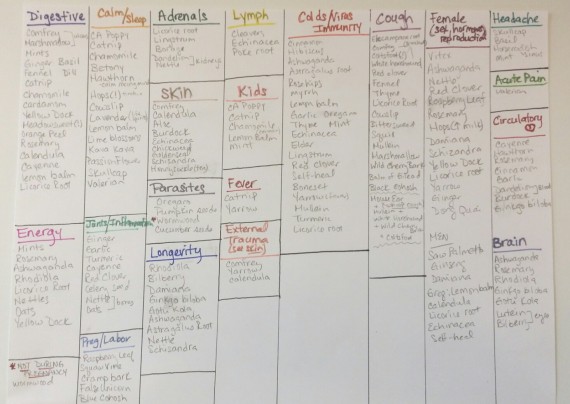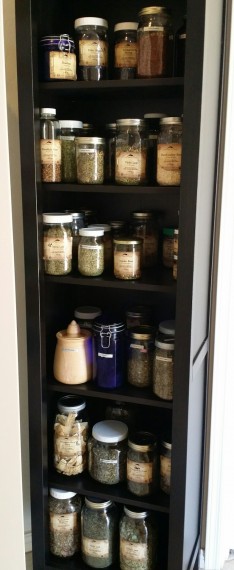
In my last post I shared how you can easily make your own herbal tinctures and why you want to do that (health, vitality, immune protection, optimal performance, enhanced energy, better dreams, sublime relaxation, fertility benefits, brain and memory boosting, to name a few). Today, I share with you some popular herbs and how they might benefit you when you make your next cup of tea or herbal tincture.
With herbs, sometimes the effect is immediate and sometimes it takes a few weeks to feel the benefits. Therefore, if you’re working on your hormones for example, and you’re a woman, you might notice improvements over the following 2 to 3 menstrual cycles if you’re using herbs (teas, tinctures, capsules, etc) on a pretty regular basis. If you’re looking for some relaxation because you’re stressed out or have a headache, then a single cup of (strong) herbal tea or a few squirts of tincture throughout the day can do the trick.
I’m having a blast making my own herbal tinctures and part of the fun comes from mixing up various herbs based on my own health goals. In order to do that I read books, articles, and blogs to determine which organic herbs to buy when making my herbal tinctures (and drinking as teas or taking in the form of syrups). I consider myself a bit of an herb collector now, and I even bought a special herb bookshelf to store my herbs (pictured below). These herbs are used in various ways, especially in my home pharmacy and travel pharmacy first aid (I’ll share that with you in the future).
It took a lot of time to compile my list, which by the way is always changing as I learn more. I decided to share my labor of love. I have not tried every herb listed, and there are many great herbs that are not on here simply because I selected ones that made sense for my family. Some I put on the list because I want to research them more before trying.
Based on my list of herbs (which are not in any particular order), I recommend you do your own research on what herbs suit you and your situation. Use this list as simply a starting point to read more about the specific herb and make sure it’s safe and proper for you to use. Some herbs aren’t recommended during pregnancy or if you’re on high blood pressure medicine, for example. Also, you might notice that I don’t list too many chinese tonic herbs. I love those and they have a place in a home pharmacy (you’ll see at least a couple below) but I don’t put a lot of emphasis on them because I’m concerned about products coming from China right now. Do your due diligence and seek the source of the herbs you buy. As I’ve mentioned many times, I’m a fan of buying my herbs from Mountain Rose Herbs, and it’s easy to see where they source each herb from the information section for each product on their website.

DIGESTIVE: comfrey, marshmallow, mint(s), ginger, basil, fennel, dill, catnip, chamomile, cardamom, yellow dock, meadowsweet, orange peel, rosemary, calendula, cayenne, lemon balm, licorice root.
ENERGY: mint(s), rosemary, ashwaganda, rhodiola, licorice root, nettles, oats, yellow dock.
CALM / SLEEP: California poppy, catnip, chamomile, betony, hawthorn, hops, cowslip, lavender, lemon balm, lime blossoms, kava kava, passion flower, skullcap, valerian.
JOINTS / INFLAMMATION: ginger, garlic, turmeric, cayenne, red clover, celery seed, nettle, oats.
PREGNANCY / LABOR: raspberry leaf, squaw vine, cramp bark, false unicorn, blue cohosh. Seek the help from your midwife for proper usage, if at all, of these herbs. Some might be appropriate during certain trimesters.
ADRENALS: licorice root, lingstrum, borage, dandelion, nettle.
SKIN: comfrey, dandelion, calendula, aloe, burdock, echinacea, chickweed, goldenseal, schizandra, honeysuckle.
PARASITES: oregano, pumpkin seeds, wormwood (not for use during pregnancy), cucumber seeds
LONGEVITY: rhodiola, bilberry, damiana, ginkgo biloba, gotu kola, ashwaganda, astragalus root, nettle, schizandra.
LYMPH: cleavers, echinacea, poke root.
KIDS: California poppy, catnip, chamomile, lemon balm, mint(s). Many more are fine for kids, I’m simply listing some popular ones.
FEVER: catnip, yarrow, boneset.
EXTERNAL TRAUMA (see also “skin” above): comfrey, yarrow, calendula.
COLDS / VIRUSES / IMMUNITY: cinnamon, hibiscus, ashwaganda, astragalus root, rose hips, myrrh, lemon balm, garlic, oregano, thyme, mint(s), echinacea, elder, lingstrum, red clover, self heal, boneset, yarrow (good for fever), mullein, turmeric, licorice root.
COUGH: elecampane root, comfrey, coltsfoot, white horehound (comfrey + coltsfoot + white horehound particularly good for bronchial issues), red clover, fennel, thyme, licorice root, cowslip, bittersweet, squill, mullein, marshmallow, wild cherry bark, balm of Gilead, black cohosh, and the following are helpful for whooping cough: mouse ear + mullein + white horehound + wild cherry bark + coltsfoot.
FEMALE (SEX, HORMONES, REPRODUCTION): vitex (turns out this isn’t a fit for me), ashwaganda, nettle, red clover, raspberry leaf, rosemary, hops (increases milk production), damiana, schizandra, yellow dock, licorice root, yarrow, ginger, dong quay, black cohosh.
MEN HORMONE HEALTH: saw palmetto, ginseng(s), damiana
HEADACHE: skullcap, basil, horseradish (sinus headaches), lavender, mint(s), cowslip (sinuses).
BRAIN: ashwaganda, rosemary, rhodiola, ginkgo biloba, gotu kola, bilberry.
CIRCULATORY / HEART: cayenne, hawthorn, ginger, rosemary, cinnamon, garlic, ginkgo biloba, dandelion, burdock
ACUTE PAIN: valerian, turmeric
Another way to see this list is by the various ways even one herb can help. See which herbs give you the biggest bang for your buck. For example:
COMFREY: digestion, skin, cough
MINT(S): digestion, energy, headaches, kids
GINGER: digestion, inflammation, circulatory
ASHWAGANDA: brain, longevity, hormones, colds / immunity, energy
SKULLCAP: headaches, sleep
LICORICE ROOT: female hormones, cough, digestive, energy, adrenals
RED CLOVER: inflammation, immunity, cough, female hormones